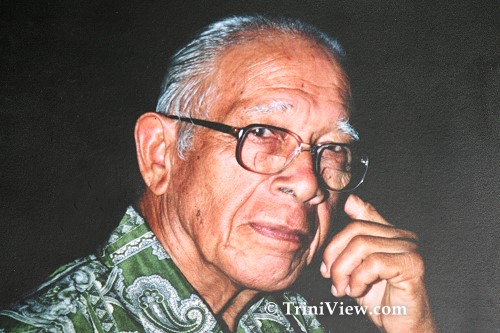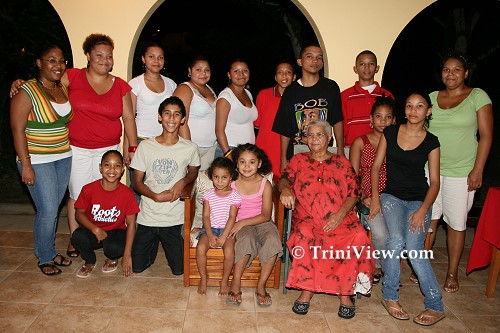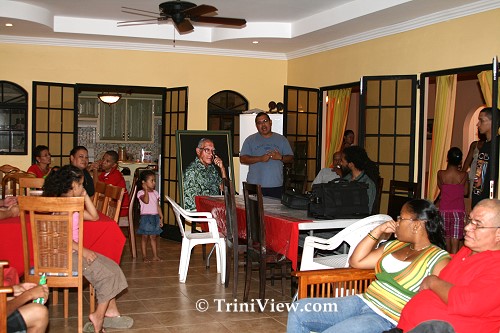 A picture of the late Jose Salina
A picture of the late Jose Salina
TriniView.com Reporters
Event Date: August 30, 2007
Posted: September 15, 2007
The Salina family held a family dinner in memory of Jose Salina, August 30, 2007, at the Salina residence, nestled in the foothills of Lopinot. The Salina family, including Jose's wife Julia, their children and grandchildren dressed in national colours to also commemorate the Independence Day Holiday.
A large picture of the late Jose Salina adorned the room as the family gathered. Present were the children of Jose and Julia Salina: Ita, Germaine, Vilma, Judy, Peter, Bryan, Nigel, Gail and Sylvia. The children of Jose Salina shared memories of their dad whom they described as a loving father and provider. Jose Salina was a gardener, a people's person who loved music, especially Parang music. Young at heart, they described their dad as patriotic, always dressing in national colours on Independence Day. With emotion and pride they described their dad as leaving a rich legacy which they draw upon in their day to day lives.
 Julia Salina and her many grandchildren
Julia Salina and her many grandchildren
Speaking with Julia Salina, wife of Jose, she shared how he planted cocoa, coffee, citrus, dasheen, plantain and other provisions. Back in those days, she described things as very different, with children having many fruits as their snacks. Married to Jose for over fifty-five years, she recalled their good times together and the deep impression he left with her. Over the years they produced ten children, twenty-two grandchildren and five great grandchildren in whose lives Jose played an active role, until his death last year at age eighty-one.
Some family members served dinner while others reminisced about the life and times of Jose Salina. As the older family members relaxed and talked, the children ran and played joyfully in the yard. One of his sons recalled how he would go to a Parang fete and dance for hours and hours. He was such a good dancer that ladies would line up to dance with him, he said.
 Relaxing at the Salina's residence
Relaxing at the Salina's residence
The following is a brief conversation among Nigel, Ita Salina and a representative from TriniView.com:
TRINIVIEW.COM: What can you tell me about your father, Jose Salina?
NIGEL: He was a father in every sense of the word. I indicated earlier when I was speaking that he was a provider; he was a true parent too. Having a child and parenting are two different things, so he was a real parent in that he provided for us, he was always protecting us, always showing us what was the proper things to do. He taught us real values and principles as children. He left a real legacy among us.
ITA: As I said before, a good man always leaves an inheritance, and I don't necessarily mean money, but values. He taught to pray, strength, character and morality.
TRINIVIEW.COM: What were some of his interests? What did he like?
NIGEL: I remember him being a gardener, so he loved the land to plant. He always had a lot of different crops coming in at different times of the year. He also was very much a family man: loved his wife and children and also loved a good Parang fete. Parang was Christmas time and because Christmas was associated with Paranging, those two things were two of his great interests.
TRINIVIEW.COM: Being a gardener, he must have been close to nature and learned a good deal from interacting with the land. Tell me about his interactions with the land.
ITA: As Nigel said, he was a farmer, and always liked a lot of food. He always liked us to come together and food was always a part of our family; anytime we came together, he would cook something. He liked people to be together. He told us to love each other and care for each other. He instilled in us to keep together and love each other; not just to love 'love', but to be considerate and sensitive to the needs of each other.
TRINIVIEW.COM: You grew up in this community. What was that like?
NIGEL: Growing up here would have been different from anywhere else, simply because a lot of family members lived close by. We were a family of nine and next door were some cousins, a family of ten children and not far away, just three houses away, a family of thirteen children. That alone could tell you.
Most people around here were relatives, so there was a certain level of closeness in the community that you don't find often in other communities.
TRINIVIEW.COM: From what you are saying, your father placed a greater emphasis on family. What have been the implications of that now that you have your own families?
NIGEL: If I am a good father today, it is because of my father. If I am a good boss, in that I have people working under me, it is because of him. My principles, my character, it is because of my father.
ITA: A lot of decisions that I make sometimes, I think about him ... what he would do in this situation? I remember his life and what he told us to do in certain situations.
TRINIVIEW.COM: What do you miss most about him?
NIGEL: His presence. Anytime I came here, coming from Port of Spain, I would drive up and when I got here on a Sunday he would always be in the porch, looking out or praying. That is one thing I miss - his presence - not just his physical presence, but his presence in general.
ITA: Talking to him too, 'cause he loved to talk. He always loved to talk about current affairs, things that happening in the country, in the world. So I miss that, that communication.
TRINIVIEW.COM: What are some of the values that people can learn from his life?
ITA: Coming together as a family, to be sensitive to the needs of the siblings, even though they are grown up.
TRINIVIEW.COM: What are some of the things that have changed in the community over the years?
NIGEL: I am sure that you would be very familiar with the word 'gayap', which is people coming together. That would be a very common thing if someone was doing a major project in this community. Those things still happen, and you see glimpses of it, but it is not as prevalent. I am using the analogy of a 'gayap' to indicate the kind of community we grew up in where the people were very united. It was a united community; that is no longer the case. Very often you meet people who are relatives from the new generations and you would not even be aware that they are relatives simply because there is no unity. I am using the word 'gayap' to emphasize the point that it is no longer like that. When we were growing up, it was very much a community of unity.
ITA: Also his first fruits ... when he reaped his first fruits he would share it with the neighbours and then he would sell whatever [remained] to the market.
TRINIVIEW.COM: Are there any last things you would like to add about his life or about your lives, about life in general?
NIGEL: There is a song that Nappy Myers sang "Bring Back the Ole Time Days". It is a very popular song and I think that it is something we really need. The old time days; we need to bring them back. The days of unity, the days of support, the days of love, the days where people really cared about each other. The country is become more and more wealthy, but with that comes materialism. I think we need to revisit the values that are important: family, support, love, peace, unity and all the things that make us into a great nation and community. We need to revisit those values, those principles that we live by.
ITA: I think that Jose lived out his purpose. He made the right choices, right along his life and that is what we too will follow. He was a very prayerful man. I used to look at him and each morning, the way he would pray. He would not just say prayers.
TRINIVIEW.COM: On behalf on Triniview.com, thank you for sharing with us.
The Salina's Family Memorial Service in pictures:
www.triniview.com/gallery/main.php?g2_itemId=206263
Homepage | Lopinot | Special Events | Photo Gallery
|
